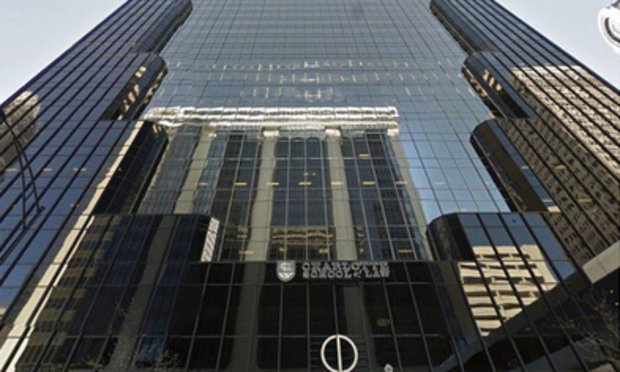Defunct Charlotte Law School and Ex-Students Reach $2.7M Settlement
If approved, the class-action settlement will end four federal suits and 90 state court suits targeting the shuttered law school.
September 12, 2018 at 02:27 PM
5 minute read
 Now-closed Charlotte School of Law.
Now-closed Charlotte School of Law.
Now-closed Charlotte School of Law will pay former students $2.65 million under a proposed class-action settlement.
The school and student plaintiffs on Tuesday asked a federal judge in North Carolina to preliminarily approve the class and the settlement, saying it was the best deal the students could hope to achieve given the dire financial circumstances of the shuttered school and its parent company, InfiLaw Corp. Judge Graham Mullen of the U.S. District Court for the Western District of North Carolina granted preliminary approval Wednesday.
Should it move forward, the class-action settlement would end four federal suits and 90 state court suits targeting the school.
Charlotte School of Law ran a net $8 million deficit in 2017, the year it closed, according to the settlement motion. InfiLaw lost more than $7 million in 2017 and $6 million through June 2018, the motion said. The settlement consists of the $2.5 million left from the school's insurance policy, as well as an additional $150,000 directly from InfiLaw.
“They're giving us everything that's left. It's hard to do better than that,” said Anthony Majestro, an attorney with Charleston, West Virginia, firm Powell & Majestro, one of six firms representing the plaintiffs involved in the settlement. “The problem with continuing to litigate is that the way their insurance policy works, it reduces the amount available to pay claims. In another year, there would be nothing left, if not sooner. That's why we believe this is in the best interest of the class.”
An InfiLaw spokesman did not immediately respond to requests for comment on the settlement, but according to the settlement motion the company has “minimal unencumbered assets that are barely sufficient to permit continued operations.”
The proposed class action would resolve all the suits against the law school, including the four pending in federal court and about 90 pending in North Carolina state court, Majestro said. If approved, students would not be able to bring further litigation against either the Charlotte School of Law or InfiLaw and would not be able to opt out of the settlement.
➤➤ Want more reporting on trends in legal education? Sign up here for Ahead of the Curve by Karen Sloan, a new email briefing from Law.com. Each week, Karen examines the transformation of legal education, spotlights innovative programs and breaks down the latest law school news.
However, the proposed settlement does not bar further litigation against Sterling Partners, the Chicago-based private equity firm that owns InfiLaw, Majestro added. The plaintiffs sought to include Sterling Partners in their suits, but a federal judge dismissed the firm last summer on the grounds that the North Carolina court had no jurisdiction over it. That decision was a major blow given that InfiLaw's financial resources are largely depleted. The plaintiffs are considering further actions against Sterling Partners in Illinois, Majestro added.
The U.S. Department of Education booted Charlotte from its federal loan program in December 2016 after it was found out of compliance with the American Bar Association's accreditation standard meant to ensure it enrolls only students who “appear capable” of graduating and passing the bar. A litany of fraud lawsuits followed, with students alleging that Charlotte hid its accreditation problems from students to prevent them from transferring, and that it should have disclosed its accreditation shortcomings much earlier. The school attempted to regain access to federal loans but shuttered in August 2017.
The proposed class consists of Charlotte students who attended between September 2013 and August 2017—an estimated 2,500. On average, they paid $42,000 in annual tuition. Payment amounts would be determined by a number of factors, including how long claimants attended, whether they transferred, and whether they qualified to have their federal loans discharged through the Education Department's closed-school discharge program. Thus, it's impossible to say what amount the average claimant will receive, Majestro said. However, the motion makes clear that the settlement is far below the $105 million needed to refund just one year of tuition for the entire class.
The final settlement amount could increase if the Charlotte School of Law recovers monetary damages from its pending lawsuit against the ABA—one of three suits InfiLaw's for-profit law schools have filed arguing that they were treated unfairly by the accrediting body. A portion of any payout from that suit will be added to the settlement pot, Majestro said.
Not only are Charlotte and InfiLaw's coffers largely empty, but the school's creditors would also get paid before students should the litigation drag on, he added. Charlotte has been sued by its former landlord for $43 million, among other creditors.
The parties held a “hard-fought” two-day settlement conference in April, resulting in the proposed settlement.
If the court approves the class and the settlement, students likely would not receive checks for at least nine months, Majestro said.
“We have got everything that is possible to get as a defendant,” he said. “As sad as it is, when you get almost all of the resources and continued litigation will deplete the resources, we really don't believe we have a choice.”
This content has been archived. It is available through our partners, LexisNexis® and Bloomberg Law.
To view this content, please continue to their sites.
Not a Lexis Subscriber?
Subscribe Now
Not a Bloomberg Law Subscriber?
Subscribe Now
NOT FOR REPRINT
© 2025 ALM Global, LLC, All Rights Reserved. Request academic re-use from www.copyright.com. All other uses, submit a request to [email protected]. For more information visit Asset & Logo Licensing.
You Might Like
View All
University of New Hampshire Law School Launches Specialized Health, Life Sciences Program

Penn State Dickinson Law Dean Named President-Elect of Association of American Law Schools

UChicago Law Professors Release Desk Reference Breaking Down Crypto, Web 3 for Attorneys
4 minute read
Trending Stories
- 1Public Notices/Calendars
- 2Wednesday Newspaper
- 3Decision of the Day: Qui Tam Relators Do Not Plausibly Claim Firm Avoided Tax Obligations Through Visa Applications, Circuit Finds
- 4Judicial Ethics Opinion 24-116
- 5Big Law Firms Sheppard Mullin, Morgan Lewis and Baker Botts Add Partners in Houston
Who Got The Work
J. Brugh Lower of Gibbons has entered an appearance for industrial equipment supplier Devco Corporation in a pending trademark infringement lawsuit. The suit, accusing the defendant of selling knock-off Graco products, was filed Dec. 18 in New Jersey District Court by Rivkin Radler on behalf of Graco Inc. and Graco Minnesota. The case, assigned to U.S. District Judge Zahid N. Quraishi, is 3:24-cv-11294, Graco Inc. et al v. Devco Corporation.
Who Got The Work
Rebecca Maller-Stein and Kent A. Yalowitz of Arnold & Porter Kaye Scholer have entered their appearances for Hanaco Venture Capital and its executives, Lior Prosor and David Frankel, in a pending securities lawsuit. The action, filed on Dec. 24 in New York Southern District Court by Zell, Aron & Co. on behalf of Goldeneye Advisors, accuses the defendants of negligently and fraudulently managing the plaintiff's $1 million investment. The case, assigned to U.S. District Judge Vernon S. Broderick, is 1:24-cv-09918, Goldeneye Advisors, LLC v. Hanaco Venture Capital, Ltd. et al.
Who Got The Work
Attorneys from A&O Shearman has stepped in as defense counsel for Toronto-Dominion Bank and other defendants in a pending securities class action. The suit, filed Dec. 11 in New York Southern District Court by Bleichmar Fonti & Auld, accuses the defendants of concealing the bank's 'pervasive' deficiencies in regards to its compliance with the Bank Secrecy Act and the quality of its anti-money laundering controls. The case, assigned to U.S. District Judge Arun Subramanian, is 1:24-cv-09445, Gonzalez v. The Toronto-Dominion Bank et al.
Who Got The Work
Crown Castle International, a Pennsylvania company providing shared communications infrastructure, has turned to Luke D. Wolf of Gordon Rees Scully Mansukhani to fend off a pending breach-of-contract lawsuit. The court action, filed Nov. 25 in Michigan Eastern District Court by Hooper Hathaway PC on behalf of The Town Residences LLC, accuses Crown Castle of failing to transfer approximately $30,000 in utility payments from T-Mobile in breach of a roof-top lease and assignment agreement. The case, assigned to U.S. District Judge Susan K. Declercq, is 2:24-cv-13131, The Town Residences LLC v. T-Mobile US, Inc. et al.
Who Got The Work
Wilfred P. Coronato and Daniel M. Schwartz of McCarter & English have stepped in as defense counsel to Electrolux Home Products Inc. in a pending product liability lawsuit. The court action, filed Nov. 26 in New York Eastern District Court by Poulos Lopiccolo PC and Nagel Rice LLP on behalf of David Stern, alleges that the defendant's refrigerators’ drawers and shelving repeatedly break and fall apart within months after purchase. The case, assigned to U.S. District Judge Joan M. Azrack, is 2:24-cv-08204, Stern v. Electrolux Home Products, Inc.
Featured Firms
Law Offices of Gary Martin Hays & Associates, P.C.
(470) 294-1674
Law Offices of Mark E. Salomone
(857) 444-6468
Smith & Hassler
(713) 739-1250








